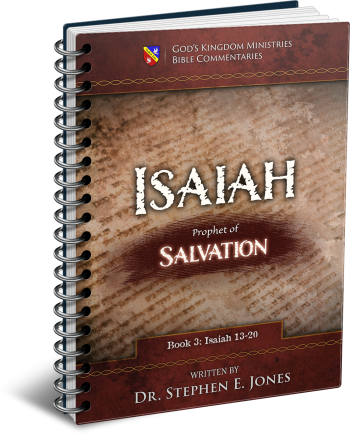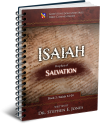Latest Posts
View the latest posts in an easy-to-read list format, with filtering options.

Isaiah is the prophet of Salvation. He is also known as the truly "Universalist" prophet, by which is meant that He makes it clear that salvation is extended equally to all nations and not just to Israel. He lived to see the fall of Israel and the deportation of the Israelites to Assyria, and he prophesied of their "return" to God (through repentance). He is truly a "major prophet" whose prophecies greatly influenced the Apostle Paul in the New Testament.
Category - Bible Commentaries

Isaiah 19 is the oracle concerning Egypt. It is a natural sequel to the oracle concerning Ethiopia, which was ruling Egypt during the time of Isaiah.
The Hebrew word for Egypt is Mitzr, and for Egyptians it is Mizraim. The Egyptians were descendants of Ham. Gen. 10:6 says,
6 The sons of Ham were Cush and Mizraim and Put and Canaan.
The Hamite nations were Ethiopia (Cush), Egypt (Mizraim), Put (Libya), and Canaan. The word Mitzr (singular) generally referred to Lower Egypt, that is, the Nile Delta. The name was plural, because the larger southern portion of the country formed Upper Egypt. Hence, there were two Egypts, or Mizraim.
Isaiah 19:1 begins,
1 The oracle concerning Egypt. Behold, the Lord is riding on a swift cloud and is about to come to Egypt. The idols of Egypt will tremble at His presence, and the heart of the Egyptians will melt within them.
The metaphor of Christ coming on a “swift cloud” paints a picture of a coming storm. The word translated “cloud” is ab, which refers to a dark cloud. The root word is uwb, “to cover with darkness, becloud.” Hence, it is a storm cloud.
This is seen also in Jesus’ answer to Caiaphas when He was being tried. Matt. 26:64 says,
64 Jesus said to him, “You have said it yourself; nevertheless, I tell you, hereafter you will see the Son of Man sitting at the right hand of Power and coming on the clouds of heaven.”
Jesus was referring to the prophecy in Dan. 7:13, “with the clouds of heaven, One like a Son of Man was coming.” Isaiah 19:1 applies this specifically to Egypt, but we must keep in mind that Egypt itself was a prophetic type that represented the world as a whole. In fact, we have seen already how the oracles about Damascus and Ethiopia apply to all the nations.
Egypt is often poetically called Rahab (Psalm 87:4; 89:10; Isaiah 30:7; 51:9), which literally means “boaster or blusterer” and has to do with pride, fierceness, or arrogance. Gesenius’ Lexicon says that its root word means “to behave proudly, act stormily (storm against) or boisterously or arrogantly.” It appears that the prophet was using storm-cloud terminology that was to be viewed against the backdrop of the poetic name, Rahab, “to storm against.”
Rahab (pronounced Rahav) is spelled in Hebrew: resh-hey-beth. When Isaiah tells us that “the Lord is riding on a swift cloud,” the word “riding” is rakav, which sounds almost like Rahav. No doubt when Isaiah chose the word rakav, “riding,” his readers would have caught the literary connection to its homonym, Rahav
So the prophet’s opening statement in Isaiah 19:1 presents Yahweh coming (via His Agent, Jesus Christ) on a storm cloud. He comes as a Conqueror of Idols (false gods), for we read that “the idols of Egypt will tremble at His presence.” The Hebrew word translated “presence” is paniym, “face, presence.”
When the idols of men’s hearts are overthrown, their hearts “melt within them.” Anyone who has experienced such times knows well the surprise and dismay that comes when the face of God exposes the deception of those idols. I speak from personal experience that caused me to write the book, Hearing God’s Voice. The second chapter is entitled, “Hearing Without Idols.”
Isaiah 19:2, 3 says,
2 So I will incite the Egyptians against Egyptians; and they will each fight against his brother and each against his neighbor, city against city, and kingdom against kingdom.
We see this pattern most vividly in the battle of Gideon. God showed Gideon how to “defeat Midian as one man” (Judges 6:16). The coalition of Midianites, Amalekites, and the children of the East (Judges 7:12) vastly outnumbered the 300 men in Gideon’s army. But when the Israelites blew the trumpets for the feast of Trumpets, smashed the clay vessels for the Day of Atonement, and shined forth the light of Tabernacles, the enemy armies turned on each other. Judges 7:22 says,
22 When they blew 300 trumpets, the Lord set the sword of one against another even throughout the whole army…
It is well said that evil destroys itself in the end. When the light shines, the darkness is put into confusion and panic as it tries to flee from the light. Gideon’s battle is a prophecy of the end-time battle in the time of Christ’s second coming.
This is seen clearly when we understand how the autumn feasts form the basis of Gideon’s battle. These autumn feasts (Trumpets, Atonement, and Tabernacles) are given as the divine strategy in overcoming the oppressors at the end of the age. By these weapons of truth, we are more than conquerors.
The prophecy certainly applied to Egypt in the near term, but when Isaiah 19:2 says, “kingdom against kingdom,” it is plain that this prophecy applied to other kingdoms as well as Egypt itself. Egypt represented the kingdoms of this world in general, who, in the end, will be annexed by “the Kingdom of our Lord and of His Christ” (Rev. 11:15).
In speaking of the end times, Jesus quoted Isaiah in Matt. 24:7,
7 For nation will rise against nation, and kingdom against kingdom, and in various places there will be famines and earthquakes.
This judgment upon Egypt, then, is just a type and shadow of the greater judgment against all the nations when their time of dominion expires. So the prophet speaks of the overthrow of Egypt in Isaiah 19:3, saying,
3 Then the spirit of the Egyptians will be demoralized within them; And I will confound their strategy, so that they will resort to idols and ghosts [at, “charmer, enchanter”] of the dead and to mediums and spiritists.
The prophet was speaking of the overthrow of Egypt in ancient times, for in the end time, the nations will be turned to Christ, not to “mediums and spiritists.” Isaiah’s prophecy in this verse speaks of Egypt’s time of tribulation in terms that are similar to what is found in Deut. 28:64,
64 Moreover, the Lord will scatter you [Israel] among all peoples, from one end of the earth to the other end of the earth; and there you shall serve other gods, wood and stone, which you or your fathers have not known.
In other words, the law of tribulation says that when a nation (in this case, Israel) persists in its lawlessness and rebellion against God, they were to be scattered and exiled, where they would “serve other gods” for many generations until their time of tribulation (judgment) ended.
This is what happened to Israel in the days of Isaiah, for the prophet lived to see the Assyrian conquest of Israel and their deportation to the land of Gamir (Ghomri, or Khumree). In similar manner, the impartial God of heaven pronounced judgment upon Egypt, condemning them to generations of spiritual blindness and to serve idols, enchanters, mediums, and spiritists. Thus, they were to consult advice and help from the dead rather than seek the living God.
Isaiah 19:4 continues,
4 “Moreover, I will deliver the Egyptians into the hand of a cruel master, and a mighty king will rule over them,” declares the Lord God of hosts.
Egypt was to be conquered by Esarhaddon, king of Assyria, in 671 B.C., and the Assyrians ruled Egypt for nineteen years. (The kings of Assyria called themselves “lord of the nations.”) Isaiah foretold this captivity a few decades before this conquest was completed.
Isaiah 19:5-7 says,
5 The waters from the sea [Nile River] will dry up, and the river will be parched and dry. 6 The canals will emit a stench, the streams of Egypt will thin out and dry up; the reeds and rushes will rot away. 7 The bulrushes by the Nile, by the edge [peh, “mouth”] of the Nile and all the sown fields by the Nile will become dry, be driven away, and be no more.
Without the yearly overflow of the Nile, crops would fail, fish would die, and the reeds of papyrus would dry up. The Wycliff Bible Commentary tells us,
“The economic ruin of Egypt would be insured by a prolonged drought (vv. 5, 6), in which the Nile would fail to overflow its banks… Hence, there would be no fish to catch and no flax to spin.”
The entire economy and power of Egypt depended upon the continuing flow of water in the Nile. The result of drought was foreseen in Isaiah 19:8, 9, 10,
8 And the fishermen will lament, and all those who cast a line into the Nile will mourn, and those who spread nets on the waters will pine away. 9 Moreover, the manufacturers of linen made from combed flax and the weavers of white cloth will be utterly dejected. 10 And the pillars of Egypt will be crushed; all the hired laborers will be grieved in soul [i.e., unemployed, reduced to poverty].
The devastation of Egypt was a prophetic pattern for what occurred on a global scale in 2020, when the global economy was shut down. The life blood of globalism (its “Nile”) is its flow of trade, and this was interrupted in 2020, causing widespread unemployment. All of the economic “pillars” were crushed in this divine judgment.
Yet keep in mind that divine judgment has come through the principle found in Isaiah 19:2. God judges His enemies by turning them against each other, so that evil destroys itself. So also the global shutdown has been self-inflicted, and the division and chaos in many of the major cities has resulted in self-destruction.
This divine judgment will culminate with the coming of Christ. He comes in a storm cloud, but the result will be the salvation of Egypt, as the prophet says later in Isaiah 19:20-22.